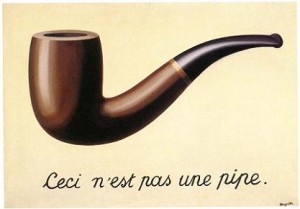Note: This is the third in a series of posts that will consider the question:
What does literature have to offer (if anything) that no other art form or media (such as video games, social media, movies, TV shows, etc.) can match?
To view the first post in this series, scroll down or click here. To view the second post, scroll down or click here.
Disrobing Its Allure
by Luis Marin, APU English major
 It may interest you to know that this is not a pipe (as it is so eloquently indicated in French handwriting). It may also interest you to know that when playing a Mario game, you are not controlling a high-jumping plumber. In fact, when watching the Lion King, you are not witnessing anthropomorphic lions that break into song, and when tuning in to I Love Lucy, you are not viewing Lucy cooking up new schemes to get into show business. In all these instances, what you are actually seeing are representations. The pipe is actually a digitalized painting of a pipe. Mario is a computerized rendering of a plumber. The musical lions are drawings. And Television Lucy is recorded video.
It may interest you to know that this is not a pipe (as it is so eloquently indicated in French handwriting). It may also interest you to know that when playing a Mario game, you are not controlling a high-jumping plumber. In fact, when watching the Lion King, you are not witnessing anthropomorphic lions that break into song, and when tuning in to I Love Lucy, you are not viewing Lucy cooking up new schemes to get into show business. In all these instances, what you are actually seeing are representations. The pipe is actually a digitalized painting of a pipe. Mario is a computerized rendering of a plumber. The musical lions are drawings. And Television Lucy is recorded video.
But here, dear reader, is the kicker: The words you have been reading are also representations. They are literally groups of markings and scribbles you have assigned meaning to. The word “pipe” is not a pipe, but it signifies one. This is, by the way, the type of representation literature specializes in. Rather than using images and sound, literature utilizes written words. Video games, films, and television shows can all tell stories, create characters, and explore themes. But only literature specializes in the art of written work, and there lies its great appeal: its artful use of its mode of representation.
Through literature’s implementation of written words, readers enjoy an unparalleled level of imaginative influence. The author provides a general roadmap, but readers provide their own specific interpretations of the roadmap. Literature adds a gratifying layer to the representation process. Instead of going from an image to meaning, readers can opt for  the scenic route of creating images from words and then making meaning out of them. In this regard, literature is much more interactive than any video game, television show, or film. This is also why literature cannot be replaced by music. Most music involves listening to someone else sing, but with literature, it is in your voice that the words are spoken or thought, but literature really should be read aloud, voices and all!
the scenic route of creating images from words and then making meaning out of them. In this regard, literature is much more interactive than any video game, television show, or film. This is also why literature cannot be replaced by music. Most music involves listening to someone else sing, but with literature, it is in your voice that the words are spoken or thought, but literature really should be read aloud, voices and all!
There are, nonetheless, other media that use words as their primary mode of representation, like social media with its user updates that are text-based. However, generic updates fail to qualify as art. Social media and literature provide different services to their participants. Both are interactive, but one aims at giving the reader formal pleasure, and the other aims at giving the reader day-to-day news about friends and family. Consider this William Carlos Williams quote: “It is difficult/ to get the news from poems/ yet men die miserably everyday/ for lack/ of what is found there.”
And that, dear reader, is what makes literature irreplaceable. Even if other art forms and media are of equal caliber, literature is the only one specializing in the art of written work. If some other art form or media one day matches literature’s artistic mode of representation, it would merely be heralded as literature itself, wouldn’t it? Literature may no longer have a monopoly in mass media, but it will never, so help me, declare bankruptcy.
Comments 10
Amen! I love the quote from William Carlos Williams and use it my course handouts to remind students of why we do what we do and love what we love!
I am so enjoying this series on the necessity of literature! Well done, everyone!
What more can I add? You said it all. I agree with your positive outlook regarding literature. As a writer who makes a living writing books and more, I am encouraged.
I am really enjoying this series and hearing from our students. Great post!
I agree with all the other responders. This is a great series. I really enjoyed reading this post, also, and I also need to admit that I feel a personal stake in the book winning!
Mr. Marin’s use of theory is interesting.
After reading this, I began to think about whether or not it is possible that language in social media could ever be “literary.” Probably not, though one does occasionally see a good Facebook stylist. And I mean, sure, someone on Facebook is always quoting Shakespeare. But is there something in the way FB is arranged that leads to a literary response?
I would answer, no, probably not.
To be provocative, are video games ever “literary”? I would say no. And I wonder if video games aren’t more like a track and field day than a novel. Though we can appreciate the plot of the game, that is only one level of the literary experience.
Thank you for this posting.
Luis–I enjoyed what you said about the semiotics of it all … what is real and what isn’t–and how literature is different in its “implementation.” Thoughtful!!
I thought that this was a very interesting and truthful take on literature in modern society. Your points on representation were very intriguing. It’s amazing how when we pick up a book it becomes our own world and since it is voiced through our mind we feel a much deeper connection with the characters and their struggles than if we played Mario Kart and watched him fall off the cliff. We don’t feel the pain when something happens in a video game whereas when the main character of a novel undergoes pain we carry that burden in our mind along with him. Great post!
Beautifully excavated. You have a unique eye to catch the obvious details that the masses are quick to forget. I agree with 100% that literature is irreplaceable. I enjoyed how you also compared literature with music and showed us the difference between them. Bravo, well written.
Great post. I agree, literature is given to us, but it is up to the reader to interpret it in one way, shape or form. This is the beauty of the written word, there can be an abundance of interpretations to one particular work.
I think Luis pointed to a really interesting idea about writing and something we often forget, that we are simply interpreting “markings and scribbles you have assigned meaning to.” This similar thought also struck me as shocking a few weeks ago in my British literature class. My professor, Dr. Eaton held up a page of Ian McEwan’s, “Atonement,” and said something along the lines of, “These markings, things we call letters, this page, is really a scene in a library, in which two people–Cecilia and Robbie–discover their physical love for one another.” As an avid reader and writer, this statement shouldn’t have come as a surprise to me, yet, I’m still bewildered by the idea. At home that night I flipped to the page Dr. Eaton had referred to and stared. He was right. These black ink marks on a white page was really an image and a story. It meant something to me and it stands as a reminder of the beauty and art of writing and storytelling.
As Luis discusses, I think that literature is so unique and irreplaceable. Where we simply consume images on a screen, I believe that reading involves a relationship. We can’t stare at a page we’ve never read before and get the message. As readers we participate in this unique form of media. We construct our own images and assign voices and unique nuances to characters that are purely unique to our own minds. Rather than a TV screen where all consumers receive the same image, as readers, the entire construction of image and sound and perception is left to us as individuals. And that is why reading might be a dying art. As we continue to progress in a society where we continually want to consume and be fed, taking the time to participate in art isn’t as easy. But I’ll argue that it’s much more rewarding and the completely unique experience to the reader is unparalleled to any other type of art.